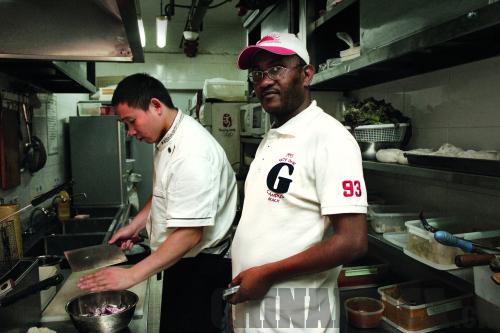|
 |
|
AFRICAN FLAVOR:Turay Lamin fulfills his dream of opening an African restaurant in China |
When Turay Lamin was a young boy growing up in northern Sierra Leone, he daydreamed of a faraway land where the culture, food and language completely differed from those of his home.
But unlike some of his peers, Lamin's eyes were not turned toward the West; he was not interested in Europe or the United States. Instead, Lamin dreamt of moving to China. "From a very young age, I was curious about what makes so many people come together," said Lamin. "Even though they are very diverse, they are under one government and they are still peaceful, so I wanted to see the undercurrents. I wanted to see what made it possible."
Lamin's Chinese dream came true in 1989, when the then 23-year-old received a government scholarship to study agronomy at what is now Beijing Language and Culture University. But even before he left Sierra Leone, Lamin knew he was not moving to China simply to obtain a university degree.
"I can say I came here because I wanted to see and learn and feel for myself," he said. "It wasn't just to study - I had to use that to get here." Other than a short stint out of China in 1993, Lamin has stayed in Beijing, where he first worked as a consultant in the import and export industry until he followed his true passion and opened an African restaurant in 1998 - it is now known as Turay's Africa House and is located in Chaoyang District. Lamin now considers Beijing his home.
"I practically grew up here," he said. "I adore Beijing." Though he may have been one of the first, Lamin is certainly not the last African to move to China long-term in order to set up his own business.
In Beijing, the African community traditionally comprised students and diplomats, but this dynamic has slowly shifted as more foreigners come to China seeking work and business opportunities. Though the community is still composed largely of students and diplomats, there are still a small number of African entrepreneurs who come to China to set up businesses.
As of 2008, there were over 300,000 small and medium-sized enterprises (SMEs) in Beijing, accounting for 99 percent of all enterprises, according to the Bureau of China International SME Fair. Though most of these businesses are owned by local Chinese people, many of them are owned by foreigners, and a handful are owned by Africans like Lamin. In the past, Africans looking for overseas ventures looked to Europe and the United States, but as China-African relations grow increasingly important and China's presence on the world stage becomes stronger, enterprising Africans are now coming to China for business opportunities.
South African Tebogo Lefifi arrived in Beijing five years ago; she had just left her job in London with a consulting firm and had plans to move back to South Africa after a three-month-long sabbatical in China. Three months flew by, and Lefifi knew she was here to stay. Lefifi's interest in China was first piqued when she noticed that many companies, including her employer at the time, were interested in expanding their reach into China. "I wanted to understand China a little bit better because everyone in South Africa was looking at the time," said Lefifi. "I figured I'd focus my career on China from a South African point of view and learn some of the language."
Lefifi enrolled in Chinese language classes while looking for jobs; she soon found companies knocking on her door, asking her to consult them on China. Her previous employer hired her to do work for them in China, and almost immediately she signed on a Chinese client. Lefifi knew she had found her niche and she started her consulting business, Africa at Work. Africa at Work provides consulting services for African clients who want to do business in China, and vice versa - with Lefifi's guanxi (Chinese for connections and relationships), she is able to match Chinese and African enterprises who are looking for partners. Lefifi finds that building relationships and being on the ground in China sets her apart from other China consultants who provide services to African investors.
|